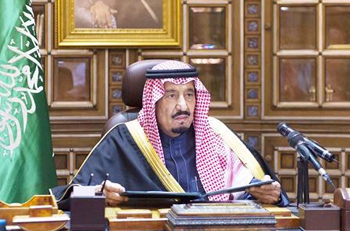
Jeddah, Jan 24: Custodian of the Two Holy Mosques King Salman took charge as the new ruler of Saudi Arabia on Friday in a smooth transition following the death of King Abdullah and pledged to continue the current government policies to ensure stability and unity in the country.
Addressing the nation, King Salman also urged the citizens to pledge their allegiance to Crown Prince Muqrin and Deputy Crown Prince and Interior Minister Muhammad bin Naif.
“We will continue by the grace of Allah and His strength to follow the right path … and will never deviate from it. Our constitution is the Book of Allah and the Sunnah of His Prophet, peace be upon him,” the king said.
King Salman said all existing ministers would continue in their positions without change.
He appointed Prince Mohammed bin Salman as defense minister and head of the royal court and the king’s private secretary.
Hamad Al-Suwailem was appointed head of the crown prince’s court with the rank of a minister while Gen. Hamad Al-Ouhali was named commander of the royal guards.
He commended the services extended by King Abdullah for the nation, the wider Muslim community and the Arab world.
He also asked Allah to help him to carry out his duties in the best manner.
Quoting from the Qur’an to highlight the transience of life, the king said that everyone on earth would die and have to face their Creator. “With a heart filled with grief and sadness,” he extended condolences to the “loyal Saudi people and the Arab and Islamic nation” on King Abdullah’s death.
He said King Abdullah had dedicated his entire life to strengthen his religion, his nation and people, defending the causes of the Arab and Islamic worlds. “Indeed we belong to Allah, and indeed to Him we will return,” he said stressing the reality of death.
King Salman also urged Arabs and Muslims to seek solidarity in the face of challenges currently confronting them. He said this would be the policy of Saudi Arabia as it moves to tackle obstacles facing it.
“We will continue in this country, which Allah has honored by choosing it as the platform for His message and the Qibla (direction to which Muslims turn while praying), to boost unity and defend our nation’s causes.” He said the Kingdom would be guided by the teachings of Islam, which is a religion of “peace, mercy and moderation.”
The king added: “I ask Allah to guide me to serve our dear people, realize their hopes, preserve our country and nation’s security and stability, and to protect it from evil. He is able to do that and there is no strength except with the support of Allah.”
Meanwhile, King Salman, Crown Prince Muqrin, deputy premier, and Deputy Crown Prince Mohammed bin Naif, interior minister and second deputy premier, received at Al-Hukm Palace on Friday a group of citizens including princes and the grand mufti, who came to take their oath of allegiance on the basis of Qur’an and Sunnah.
In a statement on Friday, Prince Muqrin commended King Abdullah’s great services to the nation. He wished every success for King Salman to carry out his duties in the service of the nation and the Arab and Islamic Ummah, adding that the king’s wisdom and expertise are required to overcome the present challenges.





Comments
Add new comment